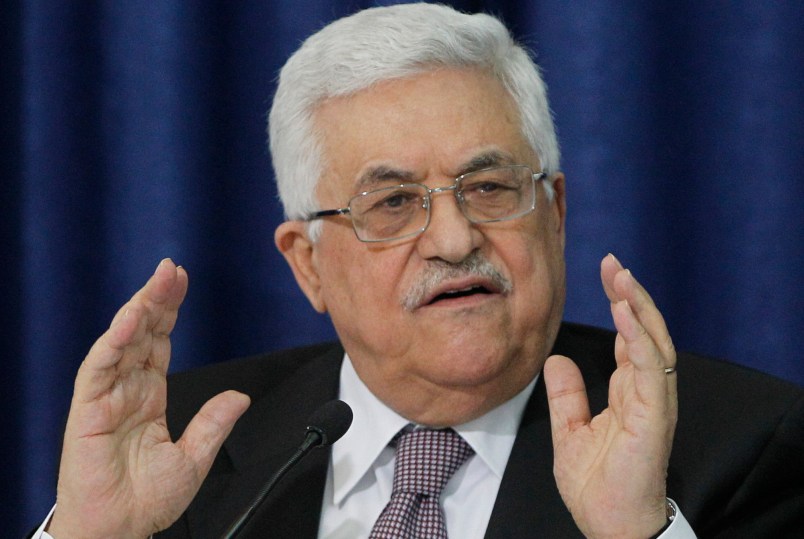RAMALLAH, West Bank (AP) — Palestinian President Mahmoud Abbas blamed Hamas on Friday for needlessly extending fighting with Israel in the Gaza Strip, casting doubt on the future of the Palestinian unity government that the Islamic militant group backs.
The remarks by Abbas come a few days after Israel and Hamas militants reached a truce after 50 bitter days of fighting.
More than 2,100 Palestinians were killed, including hundreds of civilians. Seventy one people on the Israeli side, including six civilians were killed.
Several Egyptian mediated cease-fire attempts during the conflict failed. Hamas eventually accepted almost the same truce offered at the beginning.
“It was possible for us to avoid all of that, 2,000 martyrs, 10,000 injured, 50,000 houses (destroyed),” Abbas told Palestine TV in remarks broadcast Friday. He said Hamas had insisted on discussing demands first before ending the war, which only served to prolong the violence.
The war began after three Israeli teens were killed in the West Bank by Hamas operatives in June, prompting Israel to arrest hundreds of Hamas members there. Rocket fire from Gaza on Israeli cities then escalated and Israel launched a massive air and later ground campaign in retaliation. Fighting lasted almost two months.
Egyptian mediators tried early on to get the sides to agree to a ceasefire. Several temporary truces were broken by Gaza militants.
“The Egyptian formula was on the table on July 15th, it was backed by the Arab League, it was accepted by Israel but rejected by Hamas then and now more than a month later has belatedly been accepted by Hamas,” Israeli government spokesman Mark Regev said.
“As the dust clears from the conflict I’m sure many people in Gaza will be asking why did Hamas reject a month ago what it accepted today, and if it had accepted then what it accepted now, how much bloodshed could have been avoided.”
The two sides agreed on Tuesday to an open-ended truce. The cease-fire brought an immediate end to the fighting but left key issues unresolved. Hamas immediately declared victory, even though it has very little to show for the war.
While Israel agreed to loosen a long-standing blockade to allow humanitarian aid and reconstruction materials into Gaza, many of the border restrictions will remain in place. Hamas, meanwhile, rejected Israel’s demands that it disarm.
These deeper matters are to be addressed in indirect talks in Egypt next month.
Abbas, whose Palestinian Authority formed a unity government backed by Hamas earlier this year questioned the future of that arrangement in the interview.
The unity government was meant to put an end to the animosity between the two Palestinian groups from when Hamas overran Gaza in 2007, ousting forces from the Fatah party, led by the Western-backed secular Abbas, in bloody street battles. Abbas has since governed only in parts of the West Bank, and Hamas has ruled Gaza.
Abbas is eager to regain a foothold in Gaza. With the international community shunning Hamas as a terrorist group, Abbas would be likely to operate Gaza’s borders and oversee internationally funded reconstruction efforts.
“They (Hamas) have a shadow government, if this continues it means no unity. The test is coming soon. The government needs to do its job and handle everything,” Abbas said. “I’m not saying everything needs to come to an end in one moment, this is a seven-year split that needs months or years,” Abbas said.
Copyright 2014 The Associated Press. All rights reserved. This material may not be published, broadcast, rewritten or redistributed.







Preach it, brother!
Abbas should also call out Kuwaiti cleric Tareq Al-Suwaidan who said Hamas should not accept a ceasefire and counseled Palestinian mothers to suckle their children on hate.
Wow. Where’s the reflexive Israel haters who post when articles about Gaza come up? Maybe they cannot wrap their heads around nuance.
I still hope Abbas and Fatah can be a moderating influence in what will surely be tense and delicate talks.
Glad to see him make that a public statement. No matter how righteous your claim, engaging an enemy with superior firepower is crazy, let along prolonging an encounter which affected the entire Gaza population.
Hamas actions were just as silly as Israel bombing an apartment building to target one apartment in the building. The world longs for the day when we can count on straight talk from both sides.
At the start of the fighting I recall that the PA went to the UN to complain first that Hamas was committing war crimes (presumably by using women and children as shields). Only later did they also complain about Israel.
Interesting turn of events.